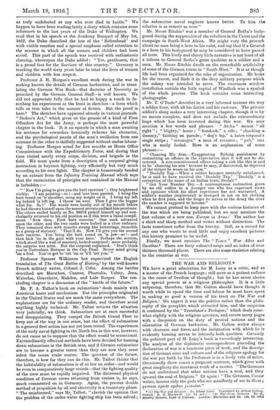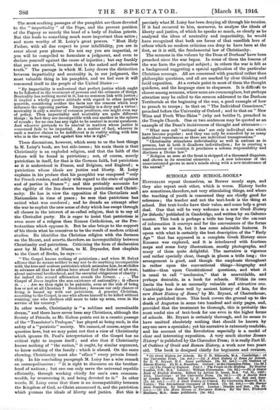THE WAR ANT) RELIGION.*
WE have a great admiration for M. Loisy as a critic, and as a master of the French language ; still more as a patient sufferer in the cause of freedom of thought ; but he has never shown any special powers as a religious philosopher. It is a little surprising, therefore, that Mr. Galton should have thought it worth while to spend the time and labour he must have spent in making so good a version of his tract on The War and Religion.' We expect it was the politics rather than the philo- sophy of the pamphlet which attracted him, and the suspicion is confirmed by the " Translator's Prologue," which deals some- what slightly with the religious question, and covers many pages with a discussion on the duty of neutral nations and the enormities of German barbarism. Mr. Galton writes always with clearness and force, and the indignation with which he is evidently burning serves to intensify both qualities. Certainly the political part of M. Loisy's book is exceedingly interesting. The analysis of the diplomatic correspondence preceding the declaration of war is a luminous piece of work, and the descrip- tion of German aims and culture and of the religious apology for the war put forth by the Professors is in a lively vein of satire. Occasionally there comes a pregnant sentence, which gives with great simplicity the innermost truth of a matter. " The Germans do not understand that other nations have a soul, and they ignored the soul of Belgium." Or again : " The Germans, Caesar writes, honour only the gods who are manifestly of use to them ; quorum aperte opihus juvantur."
• (1) The War and Religion. By Alfred Lolsy. Translated by Arthur Calton. Oxford : B. H. Blackwell. lts. Gd. net:1—(2) War-Time Sermons. By H. Bentley Henson, Dean of Durham. London: Macmillan and CO. Lill. Gd. 041.1
The most scathing passages of the pamphlet arc those devoted to the " impartiality " of the Pope, and the present position of the Papacy as merely the head of a body of Italian priests. But this leads to something much more important than satire ; and more worthy of M. Loisy's great powers. " Most Holy Father, with all due respect to your infallibility, you are in error about your phrase. Do not say you are impartial, or you will be compelled to formulate a judgment, and even to declare yourself against the cause of injustice ; but say frankly that you are neutral, because that is the naked and shameless truth." The passage in which M. Loisy draws the distinction between impartiality and neutrality is, in our judgment, the most valuable thing in his pamphlet, and we feel sure it will commend itself to the people of the United States :-
" By impartiality is understood that perfect justice which ought to be followed in the treatment of persons and the estimate of things. Neutrality has nothing moral in it, has no common link with justice it implies a wholly passive attitude with regard to other people's quarrels, considering neither the facts nor the reasons which may influence the opposing parties. Impartiality is a duty and a virtue : neutrality is only a matter of common prudence, one might even say of policy. Thus impartiality and neutrality are quite different things : in fact they are incompatible with one another in the sphere of morals ; for no ono has any right to be neutral in moral questions. And whoever pretends to be neutral in matters where justice is concerned fails to be impartial. As a matter of fact, whoever in such a matter claims to be indifferent is in reality siding with him who is in the wrong, and against him who is right."
These discussions, however, which seem to us the best things in M. Loisy's book, are but side-issues ; his main thesis is that Christianity is an exploded religion, and that the faith of the future will be found in patriotism ; not, of course, merely patriotism in itself, for that is the German faith, but patriotism as it is understood in France, and Belgium, and England ; a patriotism whose ideals are justice and liberty. M. Lolsy explains in his preface that his pamphlet was composed " only for French readers, and solely with regard to the state of opinion and of parties in France " ; and this probably accounts for the rigidity of the line drawn between patriotism and Christi- anity. He has in view the opposition of the Clerioalista and Nationalists in time of peace ; he sees that patriotism has united what was sundered ; and he dreads an attempt after the war to exploit the new sense of duty which has swept through all classes in the interest of so-called religion, that is to say of the Clericalist party. He is eager to insist that patriotism is even more of a religion than Roman Catholicism, or the Pro- testantism which opposes it. But he also brings to the support of his thesis what he conceives to be the result of modern critical studies. He identifies the Christian religion with the Sermon on the Mount, and asserts, therefore, an incompatibility between Christianity and patriotism. Criticizing the form of declaration sent by M. Babut, of Nimes, to M. Dryander, first chaplain to the Court of Berlin, he says :-
" The Gospel knows nothing of patriotism ; and when M. Babut affirms that he means neither to say nor to do anything incompatible with the true and zealous patriotism which animates him, he stultifies in advance all that he affirms later about God the father of all men, about universal brotherhood, and the essential obligations of charity : for indeed this second affirmation annuls the former. . . . The Gospel of Jesus implies the non-existence of nationality ; it effaces it.. . . Are we then right to be patriotic, even at the risk of being less or not at all Christian I Doubtless ; because our only chance of living is bound up with our patriotism. A genuine Christian, according to the Gospel, is one who allows himself to bo killed without resisting, one who declines still more to take up arms, even in the service of his country."
In other words, Christianity is " a sublime and unrealizable dream," and there have never been any Christians, although the Society of Friends, as Mr. Galton points out in a caustic passage of the " Translator's Prologue," has played at being such, in the safety of a "patriotic" society. We cannot, of course, argue the question here, but we may point out that a view of Christianity which ignores St. Paul's interpretation of the Gospel has no critical right to impose itself ; and also that if Christianity knows nothing of " the nation," it ought, by similar argument, to know nothing of the family : which is absurd. On the same showing, Christianity must also "efface" every private friend- ship. In his concluding paragraph M. Loisy has a wise remark on cosmopolitanism : " It is right to discourse on the brother- hood of nations ; but one can only serve the universal republic efficiently, through working chiefly for one's own common- wealth, by reverencing it, and being devoted to it." In other words, M. Loisy owns that there is no incompatibility between the Kingdom of God, as Christ announced it, and the patriotism which pursues the ideals of liberty and justice. But this is precisely what M. Loisy has been denying all through his treatise. If it had occurred to him, moreover, to analyse the ideals of liberty and justice, of which he speaks so much, as clearly as ho analysed the ideas of neutrality and impartiality, he would have recognized that both are forms of that unselfish love of others which no modern criticism can deny to have been at the first, as it is still, the fundamental law of Christianity.
The sermons in the volume by the Doan of Durham= have been preached since the war began. In some of them the lessons of the war form the principal subject ; in others the war is felt as a background suggesting a special application of the particular Christian message. All are concerned with practical rather than philosophic questions, and all are marked by clear thinking and lucid exposition. At a certain point in most of them the thought quickens, and the language rises to eloquence. It is difficult to choose among sermons, where none are commonplace, but perhaps attention may be called to the sermon addressed to the Durham Territorials at the beginning of the war, a good example of how to preach to troops ; to that on " The Individual Conscience," preached before the University of Oxford ; and to that on " New Wine and Fresh Wine-Skins " (why not bottles 7), preached in the Temple Church. One or two sentences may be quoted as an example of the Dean's incisiveness of thought and utterance :- "What men call ' national sins' are only individual sins which have become popular ; and they can only be remedied by as many individual repentances as there are individual transgressions."
" Christianity stimulates individuality as well in nations as in persons, but in both it disallows individualism ; for in creating a consciousness of vocation it proclaims a solemn responsibility and discloses a Divine law."
" Religion as seen at the front is stripped of a thousand disguises, and shown in its essential elements. . . . A new tolerance of the unaccustomed grows in men's minds along with a new intolerance of the unreaL"



































 Previous page
Previous page